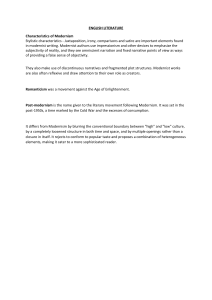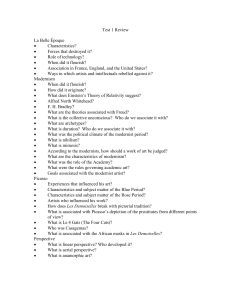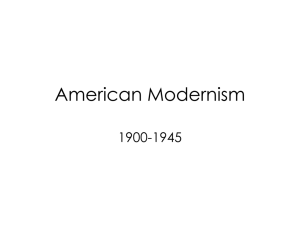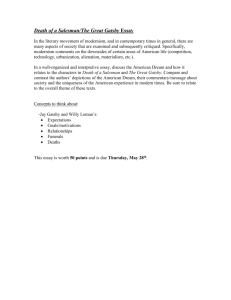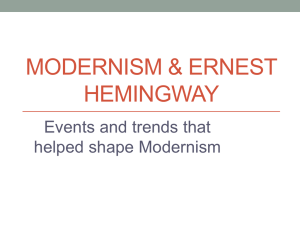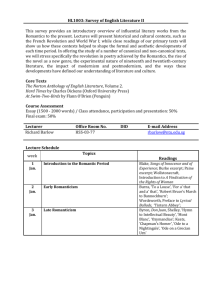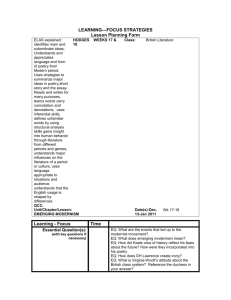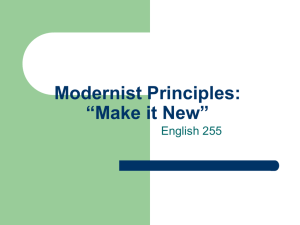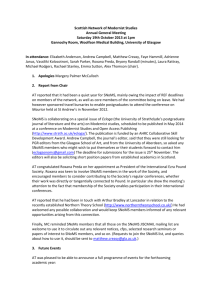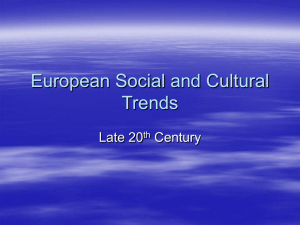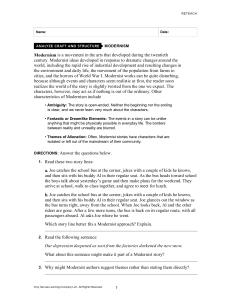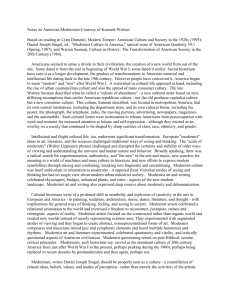MODERNISM (1910
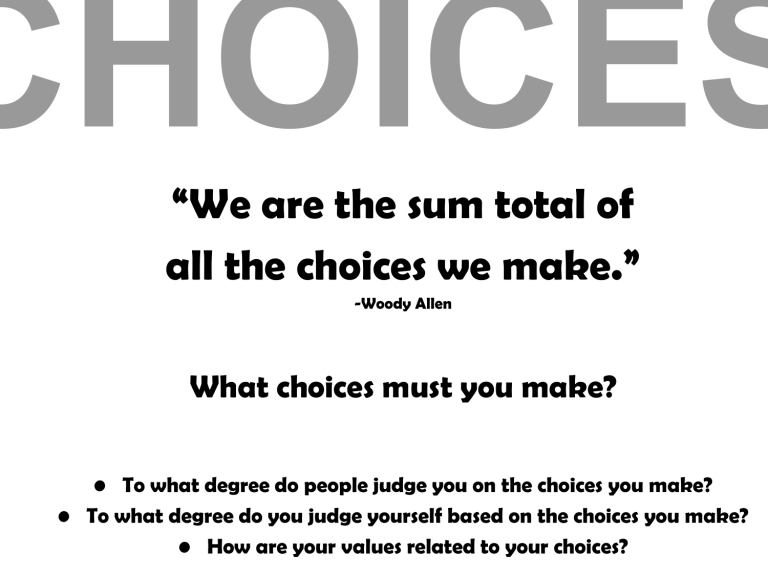
CHOICES
“We are the sum total of all the choices we make.”
-Woody Allen
What choices must you make?
• To what degree do people judge you on the choices you make?
• To what degree do you judge yourself based on the choices you make?
• How are your values related to your choices?
SUCCESS
HAPPINESS
PERSONAL
FUFILLMENT
VALUE
SYSTEM
What are the most important issues of the last century?
How do they manifest themselves into the literature we read?
RELATION TO CHOICES AND HUMAN PLIGHT
MODERNISM(1910-1940)
AN ARTISTIC, MUSICAL, AND LITERARY
MOVEMENT IN THE 20 TH CENTURY
Modernism Definition Continued
Rejection of nineteenth-century optimism, presented a profoundly pessimistic picture of a culture in disarray. This despair often results in an apparent apathy and moral relativism.
Some Modernists
Across the Arts
MODERN PAINTERS
• PICASSO
• MATISSE
• KANDINSKY
• DALI
MODERN AUTHORS
• ERNEST HEMINGWAY
• WILLIAM FAULKNER
• F. SCOTT FITZGERALD
• JOHN STEINBECK
MODERN POETS
• William Carlos Williams
• Wallace Stevens
• Marianna Moore
• Patricia Smith
• E.E. Cummings
• H.D. (Hilda Doolittle)
• Robert Frost
MODERN ARCHITECTS
• WRIGHT
• GROPIUS
• LE CORBUSIER
• VAN DER ROHE
More rationale and practical.
MODERN ENTERTAINMENT
MOVEMENT
SILENT MOVIES- OFTEN FOCUSED ON THE
DANGERS OF THE MODERN WORLD
MAJOR ACTORS-
CHARLIE CHAPLIN & BUSTER KEATON
Characteristics of
Modernism as a
Cultural Movement
FORCES DRIVING MODERNISM
• Search for reason in an unreasoned world
• Concerned with industrialization and the displacement of persons
• Bothered by the hypocrisy of
Christianity
MODERNISTS’ VIEW OF
THE WORLD
• The world is chaos
• The world is unstable
• Loss of faith
• See a collapse of morality/values
MODERNIST BELIEFS
• Alienation is an increasingly common condition
• No absolute certainties and truths
CHARACTERISTICS OF
MODERNISM
“Isn’t it pretty to think so? - Hemmingway
• LOSS OF FAITH IN
THE AMERICAN
DREAM
• REJECTION OF
ARTIFICIALITY
CHECK YOURSELF
(not the quiz)
• When was the modernist time period?
• Who were the pervading/popular modernist authors?
• What was one of the modernist beliefs?
Art and Mentality
PICASSO’S CUBISM
• FIRST PICTURE-Self Portrait 1899-1900
• SECOND PICTURE-Self Portrait, cubist period
• Role of artist changes
Art for arts sake…
Characteristics of
Modern
Literature
WRITING STYLE
• Imagery and symbolism- frequent
• Colloquial language
• Literature as art- form, style, and technique are important
• Often includes much dialogue
• Stream-of-consciousness; interior dialogue
STREAM OF CONSCIOUSNESS
• Narration is structured by narrator's or character's flow of consciousness and memory
• Associative (rather than conventional "linear")
• Often employs flashback and flash forward techniques
MODERN HERO
IN LITERATURE
• Rejection of the ideal hero
• Hero in modern story will be flawed and disillusioned
• EXAMPLE:
• Jay GatsbyThe Great Gatsby
• George MiltonOf Mice and Men
New hero: ironic, frustrating, disappointing, self-doubting, anxious
CHARACTERIZATION IN MODERN
LITERATURE
• Interest in the inner workings of the human mind
• Intense psychological characterization (Freud and Jung)
• Reader learns about characters primarily through dialogue
PLOTS AND MODERN LITERATURE
EXPLORES:
• Sense of isolation
• Uncertainty
• Disillusionment
• Disjointedness
• Meaninglessness
MODERN LITERATURE FORMS
• Literature often lacked expositions, resolutions, and transitions.
THEMES IN MODERN
LITERATURE
1.
Critique of traditional values of our culture
2. Loss of meaning and hope in the world
3. Alienation from society and loneliness
4. Violence
5. Decadences and Decay
6. Loss and Despair
Mentality in action:
In this quote, it’s
Hemmingway
used as a noun…even though it’s actually a verb.
How does this reflect modernist mentality?
word expatriate: (v.) to withdraw oneself from allegiance to one’s country. corruption of “expatriot.”
"You're an expatriate. You've lost touch with the soil. You get precious. Fake European standards have ruined you. You drink yourself to death. You become obsessed by sex. You spend all your time talking, not working. You are an expatriate, see. You hang around cafés."
Mentality in Action:
Fitzgerald
• "He knew that when he kissed this girl, and forever wed his unutterable visions to her perishable breath, his mind would never romp again like the mind of God. So he waited, listening for a moment longer to the tuning-fork that had been struck upon a star. Then he kissed her. At his lips' touch she blossomed for him like a flower and the incarnation was complete." The Great Gatsby
• The passage records Jay Gatsby's ill-fated courtship of Daisy, a captivating yet selfish and amoral woman. After renewing their tragic romance years later, Daisy proves to be the unworthy receptacle of Gatsby's idyllic dream and subsequently serves as the agent of his death.
Mentality in Action:
Steinbeck
“Before I knowed it, I was sayin' out loud, 'The hell with it! There ain't no sin and there ain't no virtue. There's just stuff people do. It's all part of the same thing.' … I says, 'What's this call, this sperit?' An' I says, 'It's love.
I love people so much I'm fit to bust, sometimes.‘… I figgered, 'Why do we got to hang it on God or Jesus?
Maybe,' I figgered, 'maybe it's all men an' all women we love; maybe that's the Holy Sperit-the human sperit-the whole shebang. Maybe all men got one big soul ever'body's a part of.' Now I sat there thinkin' it, an' all of a suddent-I knew it. I knew it so deep down that it was true, and I still know it.”
Faulkner One-Liners
• A mule will labor ten years willingly and patiently for you, for the privilege of kicking you once.
• Facts and truth really don't have much to do with each other.
• Given the choice between the experience of pain and nothing, I would choose pain.
• Clocks slay time... time is dead as long as it is being clicked off by little wheels; only when the clock stops does time come to life.
READERS ROLE
OLD READERS
• His role is passive:
• HE IS:
– Taught
– Entertained
– Emotionally involved
MODERNIST READERS
• The reader has an active role
– must give his own subjective interpretation
Rejection of nineteenth-century optimism, presented a profoundly pessimistic picture of a culture in disarray. This despair often results in an apparent apathy and moral relativism
